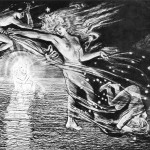The history of madness is long, convoluted, and fascinating. Different theories and treatments have come and gone, depending on the mood of the age. I think it is worth remembering that in many cultures, such episodes are not seen as mental illness, but a blessing from the gods. Many shamans have had similar experiences to what western medicine dismisses as mental illness. Read more




















Welcoming the stranger and the refugee
Homer’s Odyssey recounts the correct way to welcome a stranger who has been washed ashore: with food and drink, fresh clothing, and fragrant oil to clean the salt from the skin. Read more